
CitySeed | Collab New Haven | Culture & Community | Economic Development | Food & Drink | NXTHVN | Arts & Culture | Food Business | Arts & Anti-racism
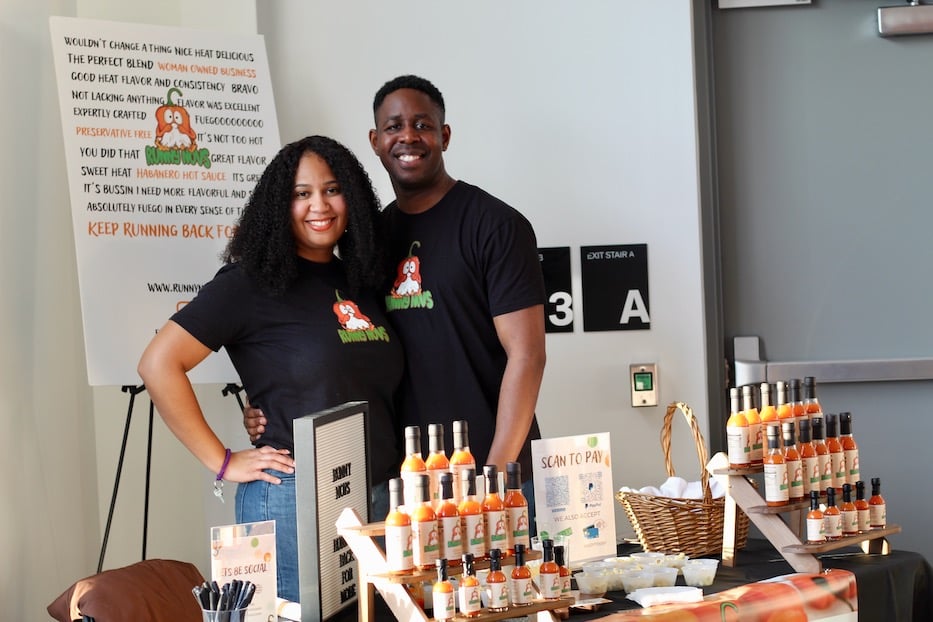
Synovia and Andrew Gibson with their sauce, Runny Novs. Lucy Gellman Photos.
Soryorelis Henry longed for a home-cooked meal. Synovia Gibson had a bumper crop of habanero peppers, spreading across her garden in a tangle of green and orange. Sheila Howard knew she could bake the perfect cheesecake. Biruktawit Tenagne wanted to feed her community—and had the skills to do it.
All four are members of CitySeed and Collab’s 2023 Food Business Accelerator, a growing network of food businesses now in its fourth cycle in New Haven. This year, the cohort has embraced a rich legacy of storytelling through food, from spicy-sweet hot sauces to oil-slicked, still-steaming dumplings that bring Nepal to New Haven.
Wednesday, members celebrated their graduation from the program in a food-filled ceremony at NXTHVN at 169 Henry St. in New Haven’s Dixwell neighborhood. In all, eight food businesses join a network that already includes cocktail-themed cupcakes, a Ghanaian ode to scotch bonnet peppers, plant-based catering and savory soul food that has stolen the hearts of market-goers across the city.
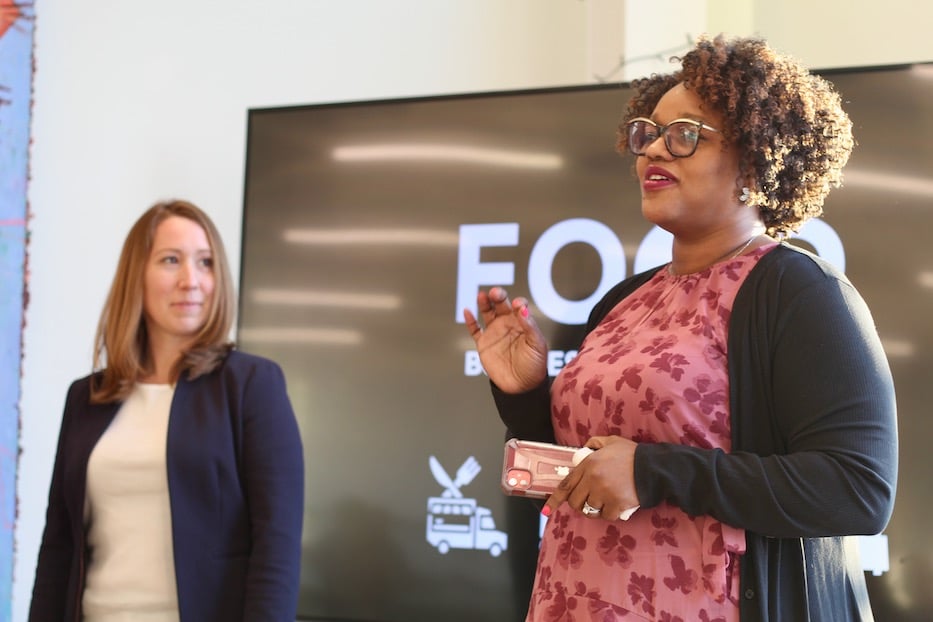
Ashley Kremser, director of operations at CitySeed, and Dawn Leaks, executive director of Collab.
“It’s 12 weeks of work, you know,” said Dawn Leaks, executive director of Collab, as attendees filled their plates with baked ziti, doro wat, dainty chicken momos and pernil that tore into tender threads beneath a crackle of fat. “It’s no small feat that they committed to this program and that they are graduating tonight.”
She turned her attention to cohort members who stood at every corner of the room, some with serving utensils still in their hands. “As you graduate tonight, you are joining a strong community of entrepreneurs,” she said.
As the program rolled into action in January, it was the idea of home and home cooking that brought eight early- and mid-career food businesses, chefs and entrepreneurs into the program. Speaking early in the evening, Smitha Shrestha introduced Mitho Garden, a new Nepali takeout service that is launching with her parents, Bharat and Rupa Shrestha, in summer 2023.
Standing at the front of the room as a slide deck rolled behind her, Smitha outlined a business plan that will begin with catering, pop-ups and takeout a few days a week, with potential expansion as Mitho Garden grows. An early catering menu includes chicken and vegetable momos, a spicy Nepali potato salad and chicken choila, a dish that features grilled chicken and garlic.
The name was easy, Smitha added. From Nepali, the word “Mitho” translates to “tasty” or “delicious.” As she spoke, an image of Nepal’s flag burst into color behind her.

Smitha Shrestha.
The Shresthas are optimistic about Mitho Garden, she said. While in the accelerator this year, the three launched a food survey that gave them parameters for the business, from how often people order food instead of cooking (two to three times a week) to the price that they’ll pay for a new food experience (roughly $18). When she recalled asking people what they associate with Nepali food and getting the answer “momomomomomo” in response, the room burst into laughter.
As fellow cohort members introduced their work one by one, they showed off their skills as both culinary artists and masterful storytellers, with a narrative that sailed from teff and coffee to pollo al horno with stewed kidney beans and plantains. Even Caribe Soul’s Hazel Lebron, who owns Madeline’s Empanaderia and could not make Wednesday’s celebration, sent a prerecorded presentation and tasting booth that left attendees dreaming about empanadas browned to a crisp at the hand-rolled edges.
For many of them, the spark was a desire to nourish the communities that have nourished them. The founder of Root Life LLC, lifelong New Havener Dishaun Harris is in the process of expanding his urban farming practice to bring healthy, affordable vegetables and salad mixes to communities experiencing food apartheid in New Haven. Around the city, he is more affectionately known as “Farmer D” for his work as a mentor and food justice advocate.

Dishaun Harris of Root Life LLC.
Born and raised in the city’s West Hills neighborhood, he saw the difficulty that his neighbors had in accessing fresh food for years. For those who didn’t have a car, the closest Stop and Shop grocery store was still a bus ride away, on a city bus that came infrequently and required exact change or overpaying to ride. As he dug into food and farming, he also learned that incidences of diabetes, heart disease, and hypertension were higher among people of color experiencing food apartheid.
“I wanted to fill that gap,” he said. “My goal is to utilize the underused spaces” in the city to make fresh food much easier to get. Harris now works in three gardens across New Haven, including the Armory Community Garden on Goffe Street, a garden at The Shack on Valley Street, and a garden behind his childhood church, Faith Temple, on Newhall Street. He works to grow and sell produce that is culturally responsive, like black-eyed peas and callaloo.
In a conversation before the ceremony, he said those roots go back to his grandmother, a native of Virginia who brought her gardening skills with her when she moved to New Haven. As long as she was physically able, she would grow her own vegetables, a mix of greens, peppers, tomatoes, beans and flowers that always meant that the family had fresh food to eat. On a table behind him, seed packets for black-eyed peas, hot fish peppers, and jute mallow peeked out into the sunlit room.

Soryorelis “Leli” Henry.
Across the room, Soryorelis “Leli” Henry and her husband, Darcus Henry, served up steaming dishes of yellow rice, plantains, and tender pork shoulder from La Isla, a still-nascent Puerto Rican restaurant on 2779 Dixwell Ave. in Hamden that grew out of the pandemic. During the first months of Covid, Henry recalled, she and her husband were driving through Hamden, trying to figure out what they wanted to eat. Nothing quite fit what she was looking for.
“We were like, ‘We want homemade food,’” she remembered. For Henry, whose parents hail from Loiza, that meant fresh Puerto Rican food made with the same care that a chef would show a member of their own family. For months, she played with the idea of opening a restaurant—no small undertaking alongside a full-time job in healthcare. The timing seemed risky, she said. “I was like, ‘Do I do it? Do I not? Am I crazy?’”
After finding a spot on Dixwell Avenue in 2022, La Isla was born. It opened officially last July, and made $245,000 in its first year. When Henry announced the number during a short presentation, the room exploded into applause.
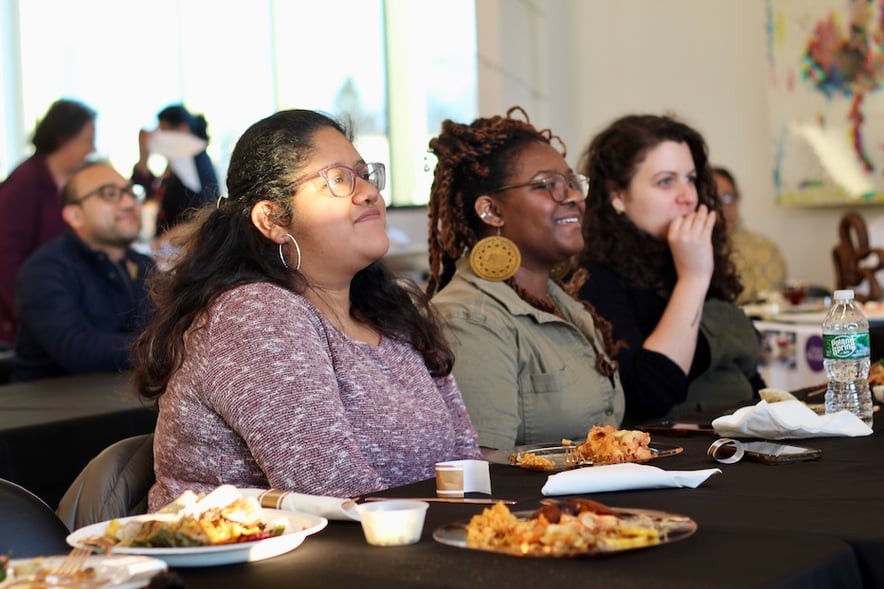
CitySeed's Sandy Flores, Frankie Douglass, and Cara Santino.
The restaurant motto—”El mejor sazón es de nuestra familia”—is meant to speak for itself, Henry said. In addition to Vinoda “Chef V” Singh, who is like a daughter to her, several of her children work in the restaurant, and her return customers become extended family between bites of baked chicken and monthly karaoke nights. The food is meant to taste like the Puerto Rican dishes she would eat growing up as a kid, and now makes at home, she said.
“We would love to grow,” she added. While the food is meant to evoke traditional flavors of home, there are also vegan and plant-based options, including her yellow rice and beans. When she was beta-testing the recipe, her family told her it would be impossible to make the dish without pork. She beamed describing the day she proved them wrong.
“I would love to come to Hartford, would love to come to Stamford,” she said.
“Come to Bridgeport!” Synovia and Andrew Gibson called from where they stood in the corner.
“They’re saturated!” said Henry. The Gibsons shook it off, insisting that the options weren’t enough for them.

Ndubisi Okeke, venture manager at Collab, and Sheila Howard of Auntie Sheelah's Cheesecakes.
That hope of growth also rang true for Sheila Howard, the home baker behind Auntie Sheelah’s Cheesecakes. Still in its early stages, the company grew out of three loves—Howard’s husband’s love for cheesecake, her love for him, and her love for baking. Born and raised in New Haven, Howard has always felt at home in the kitchen, she said Wednesday. When her three kids were growing up, cooking was a form of showing them how much she cared.
But her interest in cheesecake is relatively new. Years ago, she noticed that whenever they went out, her husband ordered cheesecake for dessert, which sparked “a quest for great cheesecake,” she said Wednesday. Connecticut, she discovered, didn’t meet her standard. For two weeks, she read recipes and watched online cheesecake tutorials. Then one night, she put her skills to the test.
The cake was still warm when she invited her husband into the kitchen at 11 p.m., pulled out two spoons, and discovered that she was onto something sweet. Eventually, she said, she wants Auntie Sheelah’s to be for Connecticut what Junior’s Cheesecake is for New York City.
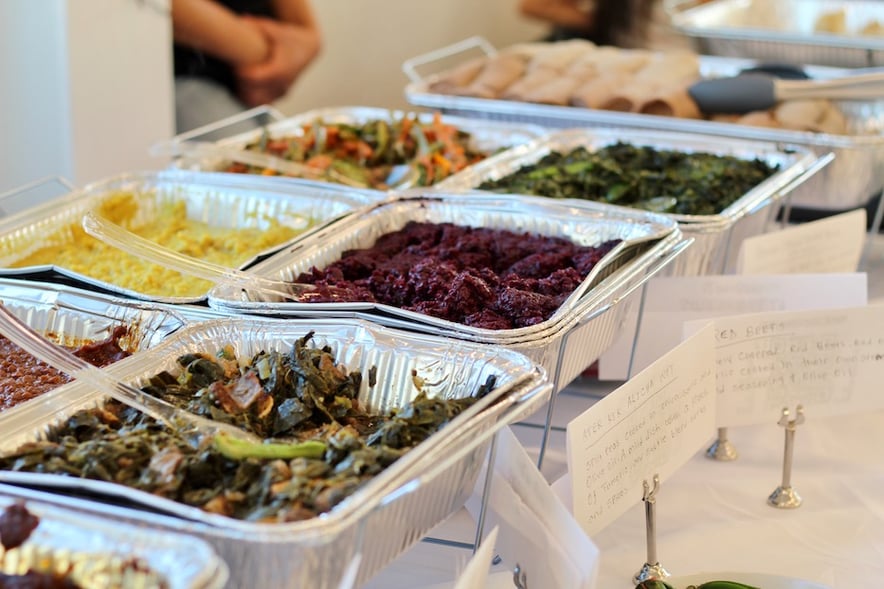
Food from Berry’s Ethiopian and Mediterranean Kitchen.
Currently, her flavors include lemon meringue, blueberry lemon, sweet potato, cookies and cream, banana pudding, and peanut butter crunch. When she makes fruit flavors, she sources fresh berries from farmers’ markets wherever she can, and cooks them down into compote so they last longer. She loves a good challenge, she added: there’s no request that she won’t try.
“I never say no,” she said. “I go into the kitchen and I’ll make it happen. I want to be that place.”
The name, like many of the 2023 ventures, is an homage to her family: Howard has been an auntie since she was seven years old, and became a mom three times over when she started building her own family. Her own mother pronounces her name as Shee-lah, which she imitated Wednesday with a panache that got the room laughing.
The business model, she added, is straightforward enough. After years working as a preschool teacher and a nurse, it’s how she shows her love for those around her. “I like taking care of people.”
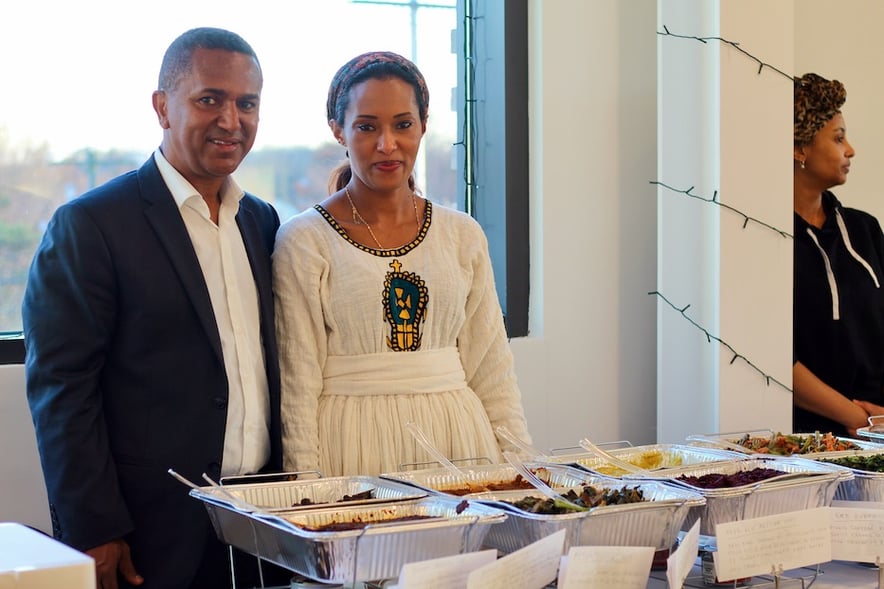
Tamrat Alemayehu and Biruktawit Tenagne.
Other food businesses are relatively new to Connecticut, and have sourced culinary inspiration from much farther afield. In early 2020, partners Synovia and Andrew Gibson moved from Queens to Bridgeport, fleeing the rising costs of living in New York City. As they made a new home in the early months of the pandemic, the couple began gardening. Sweet, hot peppers were among the first crops they thought to plant.
In 2021, they returned from a vacation to “a bounty” of habaneros in the yard, Synovia recalled. “I was like, ‘I can’t eat all of these peppers!’” She turned to her Jamaican roots, which include pickling and preserving food so that nothing goes to waste, and decided to beta test a few batches of hot sauce. Friends started giving her feedback, suggesting that it was good enough to sell.
It led to Runny Novs, a hot sauce that the two are now trying to get into grocery stores.
“Let me start the process of getting this lab tested,” she remembered thinking last year. Andrew, an employee for the New York Department of Sanitation who she described as the “creative mastermind” behind branding, came up with the title and logo as a nod to her name, and to a sinus-clearing, nose-running spice level. Meanwhile, she was able to secure kitchen space with CitySeed, in the 109 Legion Ave. kitchen that Sanctuary Kitchen uses. The brand officially launched earlier this month.
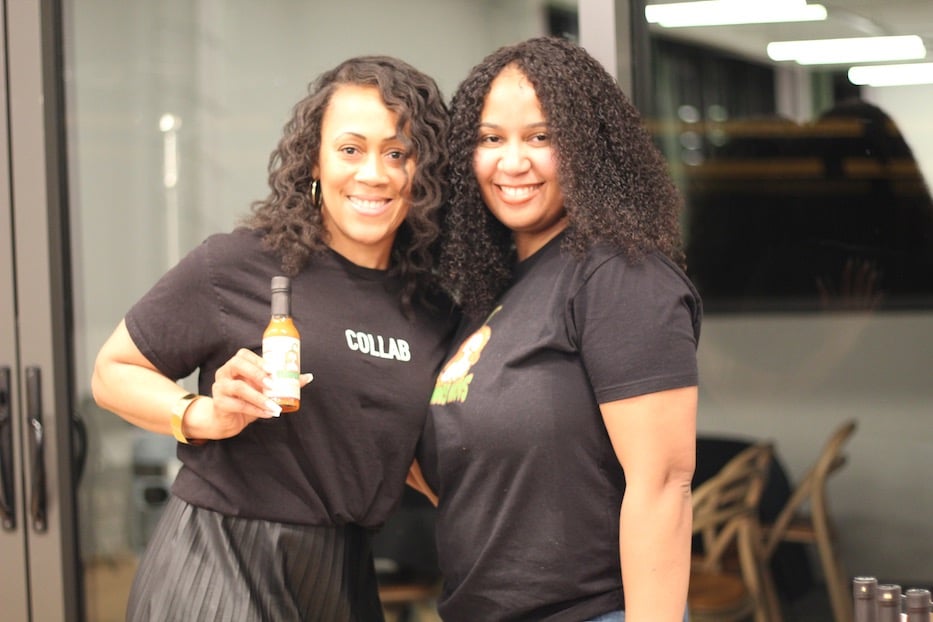
Accelerator Programs Manager Rhonda Smith and Runny Novs' Synovia Gibson.
In the sauce, which has an instant zing and tangerine orange color, the vinegar and a pickled, smoky taste is the first thing that hits, followed by a deep habanero flavor and sweetness that is owing to both capsaicin and brown sugar. In a hot sauce market that is growing, Andrew said, they don’t want to be left behind. Last year, the hot sauce market grossed $2.89 billion, according to Fortune Business Insights. By 2029, it’s expected to hit $4.72 billion.
“Jamaica is where I learned the balance between spicy and flavorful,” Synovia said Wednesday, as she and Andrew gave out samples of the sauce with tortilla chips and popcorn. She added that she is excited to work with new partners like Harris to make Runny Novs into a project that also supports local farmers.
Home—or the idea of many homes—flowed through multiple presentations. As she served up portions of doro wat, gomen, and gem-colored misir wat and yekik alicha, Biruktawit Tenagne described her nascent catering business, Berry’s Ethiopian and Mediterranean Kitchen, as a way to bring the flavors of her first home to her current one.
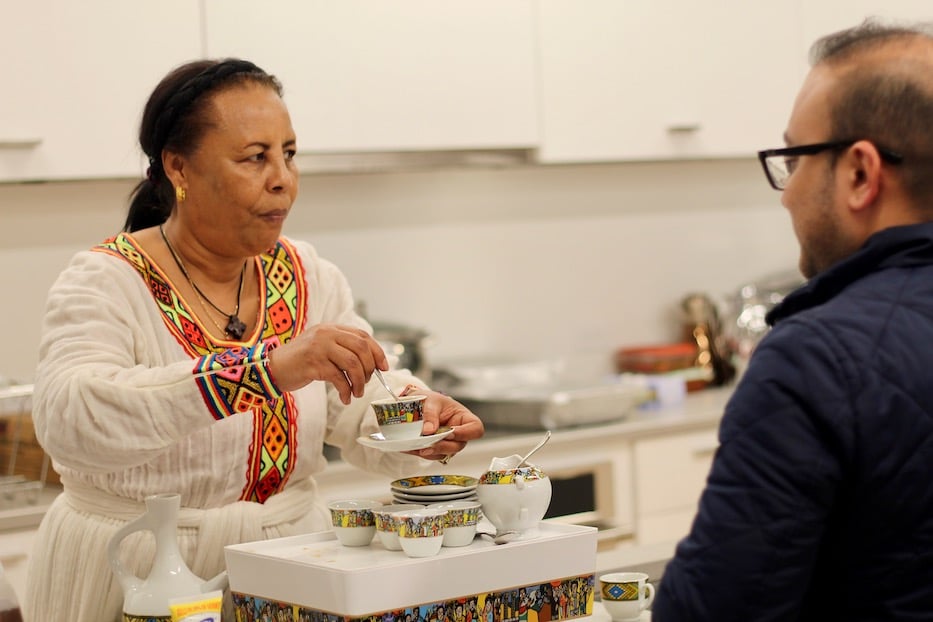
Alemnesh Galchore.
Three decades ago, both she and her husband, Tamrat Alemayehu, gained experience working in family restaurants back in Ethiopia. The flavors followed them on their respective immigration journeys, he to the United States to study engineering, and she to Dubai and later to Connecticut. The two met in Dubai close to a decade ago, and have lived together in Milford for seven years.
Now, the two are hoping to start a food truck to share those flavors with Connecticut residents. For seven years, Tenagne has been cooking for friends and neighbors in the Ethiopian community in Milford while raising her young children, and more recently also working in Havenly’s training program. She said she is inspired by the relative paucity of Ethiopian food in the state.
“I always enjoyed the best, and I feel like everyone deserves my wife’s kitchen,” Alemayehu said to rolling laughter from attendees. The goal, he said, is ultimately a food truck and a “Little Ethiopia” market, with hard-to-find ingredients like teff and coffee. In the 30 minutes of networking after presentations Alemnesh Galchore poured out steaming and bright cups of coffee, which has its roots in Ethiopia.
.jpeg?width=933&height=622&name=FoodBizAcc%20-%201%20(1).jpeg)
East Haven-based chef Aerin Zavory.
Presenting last in the evening, East Haven-based chef Aerin Zavory closed the night with Zavory’s, a nod to Italian cooking that includes vegetable-heavy and protein-packed dishes, large-scale catering, and prepared food options for families as small as four people.
Born and raised in Danbury, Zavory said it took leaving Connecticut for the West Coast to realize that “Italian food is more than red sauce and cheese.” When she returned, she wanted to bring that culinary knowledge to the Nutmeg state. Now, with 15 years of professional cooking experience under her belt, she has started a one-person operation.
In addition to catering, she teaches cooking classes in pasta making, pizza making, and fish butchery (the last, she said with a smile, is far less popular than she would like it to be). She said that her eventual dream is to open a market.
Learn more about Collab here. Learn more about CitySeed here.

